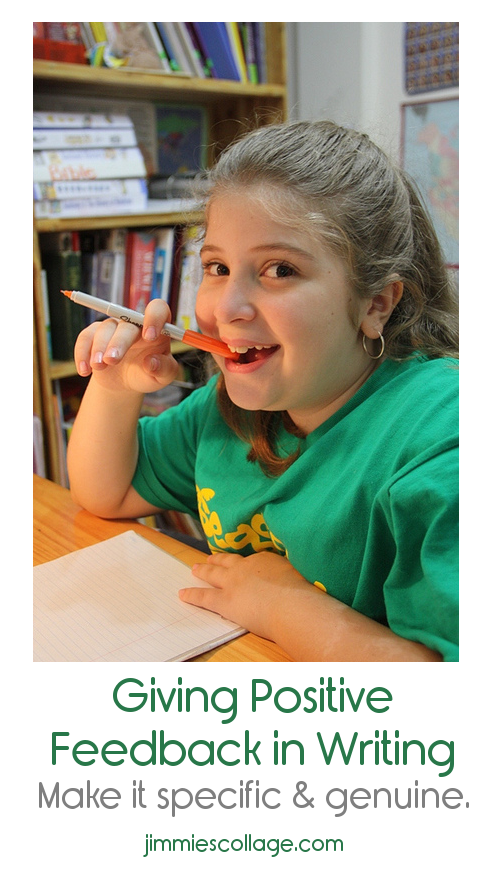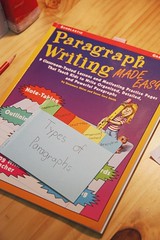
When you are helping your child in the revising stage of writing, be ever so careful with your criticism. If you are like me, you breeze over all the strong things in the assignment and narrow in on the errors and the weaknesses.
I do see the positive aspects, but I tend to only verbalize the negative aspects. It’s part of my “hurry up and get cracking” attitude: Let’s get these problems fixed so we can move on. But in doing so, I’m neglecting a really important part of the writing process.
Sprite needs to hear exactly what are the strong points of her writing as well as hear about the weaker parts.
Why?
 1. It’s a confidence booster and an attitude improver.
1. It’s a confidence booster and an attitude improver.
2. She may not even realize those are strong points. Those things may have happened accidentally. By pointing out the positive aspects, she is more likely to repeat them and understand why they are so important.
In order for the praise to work it must be two things:
- genuine
- specific
Just saying, “This is good” isn’t very helpful. The praise needs to tell exactly what was good.
Here are some examples of specific praise you can use.
- This thesis statement is very clear. When I read it, I know exactly what your essay will be about.
- This paragraph is full of details. This one even made me laugh. This one gave me a clear image in my mind.
- Your introduction really grabbed my attention. I wanted to keep reading.
- This transition word is perfect for shifting to the next main idea.
- I love how you wrapped up all the main points at the end. Your clincher was very strong.
- Great use of comma and a conjunction to join to independent clauses!
- This is a superb word choice.
- Wow, there are no run-on sentences in this entire essay.
- You didn’t get tricked by the its/it’s thing. Good job!
Notice my praise included conceptual elements (details, introduction), structural elements (transitions, thesis statement), and mechanics (its/it’s, run-ons). All are part of the written product, and all deserve some feedback.
Oh Jimmie, this is timely!
-Christine
Timely indeed. And I guess I should give some genuine, specific feedback!
Good point about kids not realizing the strong points of their writing. Also remembering to comment on concepts, mechanics, and structure will help the writer keep all those things in mind.
This has been one of my weakest skills in homeschooling. I find it very hard to critique their writing. I am procrastinating looking at Mr. A’s Lord of the Flies essay right now….want to look at it for me? I am trying to use grading rubrics for this visual spatial learner and it helps both of us have a way to find the positives and negatives in his writing.
Great post, one that many of us need to remember.
Perfect advice! I love it how you focused on the importance of giving comprehensive feedback – not only (negative) criticism.
Read Aloud Dad
When I was teaching high school English I used to work on writing skills a lot and you are right, positive is so important. I would often say things like “Well your creativity, the most important element that certainly can’t be taught is there in spades! Now let’s just work on that pesky spelling and paragraphing which is the boring bit but needs to be right.” I’d always let them know what was valued and then move on to the specific targets that I wanted them to work on. I think being specific and quantifiable is so important, let them know exactly what you want them to do rather than a vague ‘improve structure’. Good article on an important topic.
All great advice! The writing process is so complex, it’s easy to overwhelm our kids with corrections!
Great tips! You have given wonderful examples of positive comments. Good writing is such a complex combination of skills that it helps to know what to focus on when giving the assigment and bear those skills in mind when grading. So if, for example, we focus on topic sentences in paragraphs, or attention grabbing introductions, that is the aspect that needs the most encouragement and the other technical details are secondary.
Thanks for posting this, I SOOOO needed it, especially now. Need to take these points to heart.
A great reminder! Love the suggestions for positive comments. Thank you!
What a wonderful post. Giving positive feedback on children’s writing is something I learned when I taught in the public schools, and it is something I have tried to remember with my own children. I have noticed with my own kids, that the more positive feedback that I give them, the better they take the criticism and are able to use it to improve their writing.
Great post, Jimmie! One tip I have for critiquing the writing of a new or reluctant writer is to focus on one main thing at a time until it is mastered. I had one of my children write many shorter length pieces and work on, let’s say, paragraph transition, or subject-word agreement, or clear topic sentences, etc. Focusing on one aspect at a time helped my student not be overwhelmed while giving him time to see where he needed to improve.
Dana
Dana Wilson
Epi Kardia Home Education, LLC
http://www.epikardia.com
http://www.epikardia.com/blog/curriculum/is-santa-real/
And so true in all aspects of teaching and parenting. The criticisms are easy and always ready. The praise for a job done right . . . or the good parts of a job done not so well . . . is not quite as quick in coming. Though every bit as important, and often more so.
This is really great advice, not only for writing, but for homeschooling and parenting in general.
When I review my son’s writing assignments, I also start by reminding him that receiving feedback and making corrections is part of the writing process. I tell him that when I write e-mails, letters, blog posts, etc., I always have to go back and make changes and revisions. Sometimes, I even show him something I’ve marked up. I think this helps him understand that it’s not personal.
Hey Jimmie, I tried to link over to the article that you included, but I think the link may have changed. Just fyi. I’d love to read the article. Thanks for the cont’d reminder about pointed out what’s working in a piece of writing.
Aimee, You are right! The article is GONE. How terrible. It was a fantastic article, and no amount of searching can turn it up. (Even the Wayback Machine at Archive.org doesn’t work.) I’m so sorry!